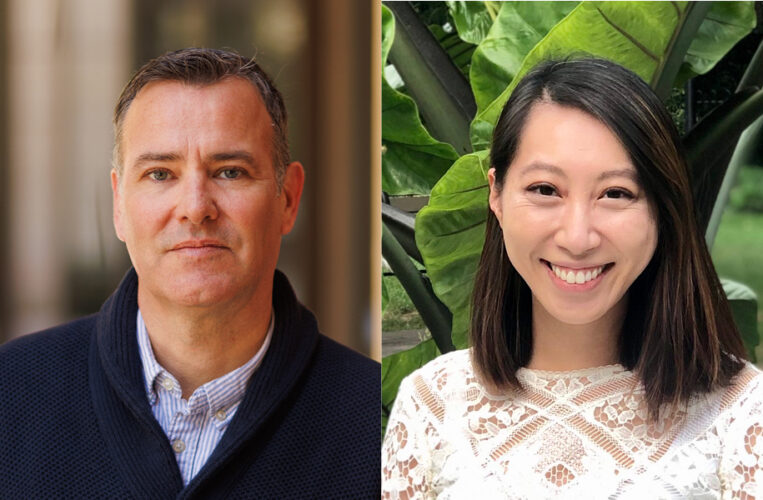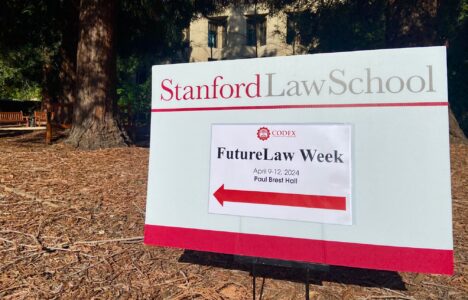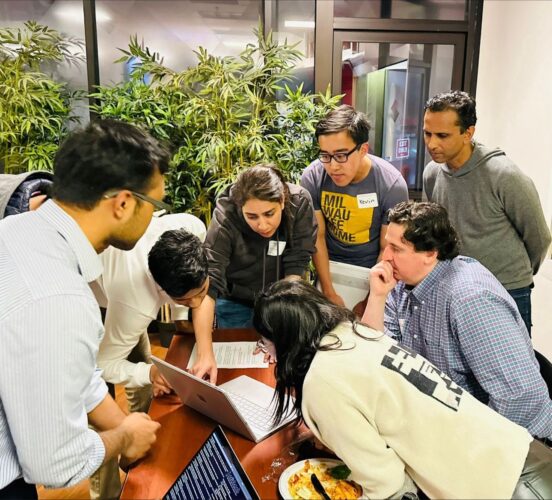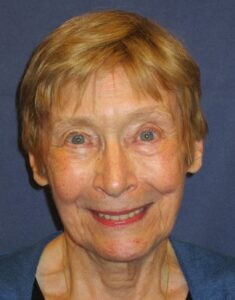FutureLaw at 11: A ‘Hive of Activity’ and a Full Week of Events
In 2013, when the first FutureLaw conference was held at Stanford Law School (SLS), the impact of driverless cars was one of the hot topics.
Eleven years later, with autonomous taxis making the rounds in San Francisco and other cities, those early conference discussions almost seem to be from another lifetime, said Roland Vogl, conference organizer and co-founder and executive director of Stanford’s Center for Legal Informatics (CodeX), which annually presents FutureLaw at SLS. This year, panels on “Hybrid Legal Intelligence: Bridging the Neuro-Symbolic Divide” and “Generative AI and Intellectual Property,” among others, took attendees on a deep dive into the transformative impact of technology on the legal profession, the justice system, and societal regulations.

The ever-expanding, premier industry-and-academia event brings together “the forward-thinkers, risk-takers, and innovators” at the intersection of law and technology, namely in the area of computational law—the automation of legal reasoning.
Just as technology has rapidly evolved over the last decade, so too has FutureLaw, which is now dubbed FutureLaw Week. This year’s event kicked off on April 6 with a large language model (LLM) hackathon and technical boot camp, and continued over the next two days with workshops on topics such as “Computable Contracts in Insurance and Finance.” The main event, an all-day conference on April 11, brought more than 200 people to Paul Brest Hall, including delegations from across the United States, Europe, and Asia. An April 12 workshop on generative AI closed out the week’s events.
“FutureLaw always feels like a homecoming for people in the law and tech community,” said Megan Ma, a CodeX fellow and associate director of CodeX and the Law, Science, and Technology Program, as well as an organizer of and presenter at FutureLaw. “People who are part of the different, emerging areas of technology and law have found homes, or enclaves, for themselves at FutureLaw, whether during the side sessions or the main conference. It has grown so much because more and more people are thinking seriously about the intersection of law and technology and they’re focused on so many different technologies and different uses underpinning those technologies.” FutureLaw participants include researchers, engineers, entrepreneurs, lawyers, investors, and policy makers.
“There is this tremendous excitement every year that just gets stronger,” added Vogl, who, in addition to running CodeX, also serves as executive director of the Stanford Program in Law, Science and Technology. “There’s this hive of activity, and a lot of energy. And now the hackathon has brought in a whole group of new people, including law students.
Interdisciplinary Energy
Stanford Computer Science PhD candidate Joon Sung Park’s presentation of his recent paper, Generative Agents: Interactive Simulacra of Human Behavior, was one moment that illuminated the interdisciplinary energy of FutureLaw, Ma said. “His paper is one of the few papers called ‘viral papers,’ as in the second it was published, it was downloaded in the tens of thousands across the world,” Ma said. “When he spoke at FutureLaw and broke down the technology issues to lawyers and others who were attending the workshop, people just flung themselves at him wanting to talk about the possibilities in the legal realm. Being able to showcase this really out-of-the-box thinking in the computer sciences space, which is happening right here at Stanford, was something really special to witness.”

Dan Ho, the William Benjamin Scott and Luna M. Scott professor of law and director of the Regulation, Evaluation, and Governance Lab (RegLab), gave the opening keynote address, focusing on “Regulation, Rights, and Tradeoffs in the Age of GenAI.” David Freeman Engstrom, LSVF professor in law and the co-director of the Deborah L. Rhode Center on the Legal Profession, gave the closing keynote on “Legal Tech Futures.” Mark Lemley, William H. Neukom professor of law and the director of the Stanford Program in Law, Science and Technology, and Paul Goldstein, Stella W. and Ira S. Lillick professor of law, served on a panel on “Generative AI and Intellectual Property.” SLS lecturer Margaret Hagan, executive director of the Legal Design Lab, spoke about “AI and Access to Justice.”
Hackathon and Boot Camp
CodeX launched its first LLM hackathon last year, just after the 2023 FutureLaw conference, marking the first time that a hackathon was held, anywhere in the world, at the intersection of LLMs and the law. This year, approximately 400 people from five continents participated, including law, engineering, linguistic, and business students—almost double the number from 2023. Over two days, including a day of hands-on training (aka “Bootcamp”), interdisciplinary teams competed in technical and non-technical tracks to come up with new ideas for streamlining, automating, and augmenting legal practice through the use of LLMs like ChatGPT. The Bootcamp, co-led by Ma and CodeX fellow and SAP Chief Operating Officer Jay Mandal, was a new offering this year, launched, in part, to give students studying law and other non-technical areas a primer in the technological aspects of creating new legal tools.
Hackathon participant Kevin Yan, JD ’26, won the Best First Build Award along with his business school, engineering, and linguistics teammates. Yan, who is also pursuing a medical degree at the University of Pennsylvania, called the hackathon “intense, exhilarating and deeply collaborative.”

“I got interested in AI and tech after seeing how these innovations could radically transform the healthcare field as a medical student, cutting administrative burden and improving the patient experience,” he said. “My team created DueDiligent AI, a generative AI tool that automates M&A due diligence related to key contracts and business value assumptions. In seconds, it can identify excessively risky contract provisions, such as short termination clauses and provisions that could permit large fluctuations in cost. At the same time, it also flags current events that could undermine a business’s financial outlook, like a manufacturing plant’s closure recently reported in the news.”
Another SLS student, Camila Chabayta, JD ’25, was part of the team that won the Best Overall prize for their LLM dubbed Vet’s Claim, which “empathetically assists” veterans with filing their medical claims to Veteran Affairs, she said. “We used the latest regulations, 20 years of VA case findings, and AI tools to design, write, and provide a tailored claim that helps veterans get their application for disability benefits right the first time.”
Codex Prize Shared by SLS Alum
The CodeX Prize is an annual award given to an individual or group for a noteworthy contribution to computational law—an idea, article, book, computer application, computer tool, or organization that has had a significant and enduring positive impact on the field. This year’s CodeX Prize was shared by Anne von der Lieth Gardner, LLB ’58 (BA ’55, PhD ’84) and L. Thorne McCarty, professor emeritus of computer science and law at Rutgers University.
Harry Surden, affiliate faculty and associate director of CodeX, called the winners “pioneers” who “saw the potential of AI and law, as well as legal informatics, long before it became a mainstream topic of discussion.”

Gardner is “the epitome of a computer and law pioneer,” according to Surden. She produced a series of landmark works, including the highly influential book, An Artificial Intelligence Approach to Legal Reasoning, published in 1987. In her research, Gardner explored ideas that have become fundamental to AI and law, such as the concept of “open texture” and theories of representing legal rules in computable form.
Similarly, in his seminal 1977 Harvard Law Review article titled Taxman: An Experiment in Artificial Intelligence and Legal Reasoning, McCarty was among the first in the world to formalize aspects of law, specifically tax law, into a form that a computer could reliably process.
About CodeX
CodeX – The Stanford Center for Legal Informatics is jointly operated by Stanford Law School (SLS) and the Stanford Computer Science Department. CodeX’s emphasis is on the research and development of computational law, the branch of legal informatics concerned with the mechanization of legal reasoning. The center allows researchers, lawyers, entrepreneurs, and technologists to work side by side to advance the frontier of legal technology, bringing new levels of legal efficiency, transparency, and access to legal systems around the world.
About Stanford Law School
Stanford Law School is one of the nation’s leading institutions for legal scholarship and education. Its alumni are among the most influential decision makers in law, politics, business, and high technology. Faculty members argue before the Supreme Court, testify before Congress, produce outstanding legal scholarship and empirical analysis, and contribute regularly to the nation’s press as legal and policy experts. Stanford Law School has established a model for legal education that provides rigorous interdisciplinary training, hands-on experience, global perspective, and focus on public service, spearheading a movement for change.
